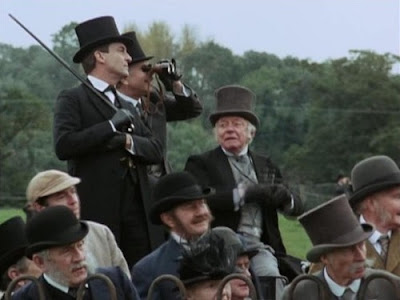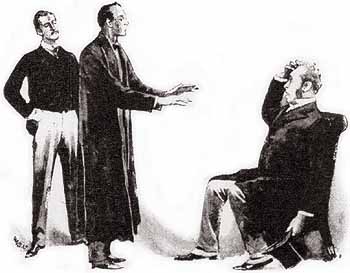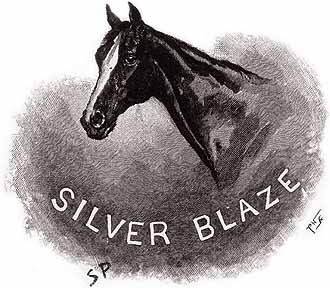Monday, November 19, 2012
Currently on Twitter...
As part of an ongoing project on my Twitter feed, I'm delivering stories from the Sherlock Holmes canon in tiny installments of 140 characters or less. I recently finished up "The Adventure of the Sussex Vampire," a seasonal story in which Sherlock Holmes famously states, "This agency stands flat-footed upon the ground, and there it must remain. The world is big enough for us. No ghosts need apply."
The current story is "The Beryl Coronet," in which Watson imparts some sage advice about the treatment of madmen, and Holmes shows that even the most damning evidence does not necessarily indicate a concrete conclusion.
Check out my Twitter feed for a daily installment, although I am usually inspired to post more than once a day. And don't forget you can read through the original canon online.
Sunday, November 11, 2012
“The Meaning of This Extraordinary Performance” (COPP): Granada Television’s “Silver Blaze”
“Another of Colonel
Huggins' interests was riding, an enthusiasm also embraced by Jeremy. As a
child, Jeremy had a pony named ‘Babs’ whom he trained to climb stairs. Jeremy
actually rode Babs into the Grange, which didn't sit well with Nanny Clifford, especially
when it came to the inevitable by-products of Jeremy's four-legged,
unhousebroken guest. (Nanny wasn't too pleased when Jeremy rode a donkey up
into his room, either – the donkey had no trouble going upstairs, but balked on
the way down.) Jeremy took riding lessons and competed in gymkhanas (equestrian
field days consisting of exhibitions of horsemanship and pageantry). Although
Jeremy decided at an early age that he wanted to become an actor, he once said
that he wished he could have been a jockey, too. (He probably enjoyed filming
the Holmes story ‘Silver Blaze’.)” (Lisa Oldham, The Brettish Empire)
“My ignorance cries aloud to heaven,” wrote Sir Arthur Conan
Doyle about “Silver Blaze,” a short story appearing in The Memoirs of Sherlock Holmes. “I read an excellent and very
damaging criticism of the story in some sporting paper, written clearly by a
man who did know, in which he
explained the exact penalties which would come upon everyone concerned if they
had acted as I described. Half would have been in jail, and the other half
warned off the turf forever.” And the 1988 adaptation of “Silver Blaze” by
Granada Television certainly included its own share of mistakes. The episode
famously exceeded its allotted budget due to its need for an on-location shoot,
and the large number of horses and human extras needed for the race scenes. The
episode was preceded by Granada’s rendering of “The Devil’s Foot,” another
episode that had required an expensive on-location shoot. This confluence of
factors meant that by the time Granada was ready to produce their adaptation of
“The Hound of the Baskervilles,” the series’ budget was already seriously
compromised, and the fate of the HOUN adaptation with it (Davies 139). There
are many arguable reasons as to why Granada’s HOUN failed when it had every
expectation of success – not the least of these being that because of the DEVI
and SILV adaptations, producer Michael Cox simply could not afford to construct
the HOUN film that he had envisioned.
But its role in the failure of the HOUN adaptation does not
necessarily mean that the production of SILV was not a success in its own
right. The episode’s location, expensive as it must have been, is atmospheric
in a way that a sound stage or even a cleverly set-dressed local field could
never be. The vast and unforgiving
loneliness of the fields of Wales, Cheshire and Lancashire in the north of
England are desolate and forbidding in the way that the moorlands of Dartmoor
must certainly be. The stables of King’s Pyland appear as a mere dot on the
landscape as Sherlock Holmes (Jeremy Brett) and Dr. Watson (Edward Hardwicke) travel
in with Colonel Ross (Peter Barkworth). The neighboring stable of Backwater is
miles away and likewise the odds of finding the missing Silver Blaze seem remote
in the extreme. It is the expansiveness of the landscape that impresses upon
the viewer the enormity of the Detective’s task. A horse lost on the sprawling
moor – even a racehorse as extraordinary as Silver Blaze – will be as difficult
to locate as a black cat in a coal cellar. “I expect a miracle from you, Mr.
Holmes,” says Colonel Ross. The atmosphere created in the episode (of which the
landscape plays no small part) is a testament to the extent of the miracle that
was produced.
And in regards to those costly horses and extras that seem
to adorn every scene in SILV? The presence of more horses makes the absence of
Silver Blaze even more profound and even more significant. King’s Pyland
appears to be positively brimming with horses – why is the missing one so
important? It is clear that none of the other horses can match Silver Blaze in
strength, speed or skill – and the horse in question is not even present for
the comparison! Bayard, the only other horse mentioned as being remotely in the
same league as Silver Blaze, is admitted by Colonel Ross as just “intended for
a pacemaker.” Indeed, Colonel Ross seems to be going to great lengths to
reacquire Silver Blaze – even calling on Sherlock Holmes against his better
judgment. The identity of the murderer of John Straker, Silver Blaze’s trainer,
feels almost secondary to locating the missing horse. Sherlock Holmes even goes
so far as to chide Colonel Ross for his neglect. He asks Colonel Ross, “[The
location of Silver Blaze] is a minor point, of course, compared with the question
of who killed John Straker?”
As for the extra cast members – what is a dramatic reveal
without a crowd of people to witness it? When Holmes theatrically reveals the
identity of Straker’s killer (who was Silver Blaze, of course, acting in
self-defense), it is in the Winner’s Circle of the Wessex Cup, surrounded by a
large crowd of well-wishers. As the realization dawns on Colonel Ross that he
has been horribly deceived by a man that he trusted implicitly, the slowly encroaching
crowd makes his error in judgment seem palpable. For a moment the man seems
surrounded by his mistakes – rather than by onlookers – unable to escape them. But
perhaps even more simply: what is a story about a racehorse without other
horses to race against, and people to watch the race?
 |
| Photo Credit: bookishadventures.tumblr.com |
The episode also lends the necessary weight and grandeur to
one of the most vaunted and recognizable canonical lines. But before Jeremy
Brett’s Sherlock Holmes ever speaks a word about the infamous “dog in the nighttime”
(the one who did nothing, of course), there is a scene in which he enters the
missing racehorse’s stable and is subjected to the snarling and vicious barks of
the resident canine. There is a pause, a moment of utter stillness, marked by
nothing more than the subtle upward curve of Brett’s mouth. This is not the frenetic
silence of a man frozen in terror by the unexpected onslaught of an unruly dog,
hoping to avoid injury. This is a moment of intensity and gravitas, as
understood by a man for whom the moment of knowing
supersedes all other factors and distractions.
There is quite a lot that is tangible about Granada’s adaptation of SILV – moments that are so
significant and weighted that the viewer can seemingly reach out and touch
them. Holmes reaching out to gently touch the hand of a distraught maid as she
recounts finding John Staker’s corpse. Holmes reaching barehanded into the
muddy landscape to retrieve a hidden nail. Sherlock Holmes, Dr. Watson, and
Inspector Gregory (Malcom Storry) passing around a cataract knife as if it were some precious
artifact. The Great Detective hanging his cane on the door of the stable with a
significant look and gesture, just before he washes the black paint from a
horse, only to reveal the animal beneath as the missing Silver Blaze. Holmes
grinning and snickering as he collects his winnings after the Wessex Cup race
(one of those moments of Sir Arthur Conan Doyle’s “ignorance” that mentioned
earlier). Finally, Holmes reaching out to stop an annoying ringing dinner bell
with his hand, as he recounts the solution of the case to Colonel Ross and Dr.
Watson.
 |
| Photo Credit: bookishadventures.tumblr.com |
The viewers of Granada’s Sherlock Holmes series can wistfully speculate what would have become of their
adaptation of HOUN had budgetary mistakes not been made in the production of
DEVIL and SILV. Even Jeremy Brett was known of having wished that they could go
back and re-film that episode (Davies 144). But speculation is a fruitless endeavor,
changing nothing. And it distracts from the fact the Granada’s SILV episode is
outstanding and artfully constructed in its own right, with unforgettable
moments that linger after the episode ends – which leave an indelible
impression on the screen.
oOo
Sources:
• Stuart
Davies, David. Starring Sherlock Holmes: A Century of the Master Detective on Screen (January 2006).
“Better Holmes & Gardens” now has its own Facebook page. Join by “Liking” the page here, and receive all the latest updates, news, and Sherlockian tidbits.
Subscribe to:
Posts (Atom)



